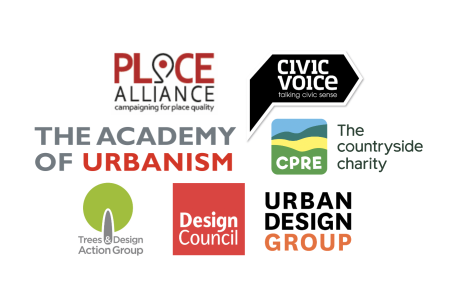Letter to the Rt Hon Robert Jenrick MP
Secretary of State for Housing, Communities and Local Government
Department for Communities and Local Government
Dear Minister,
A design quality unit for England
We, the undersigned organisations, congratulate the Government on its increasing commitment to deliver a better designed built environment and collectively welcome the broad thrust of analysis and advice advanced by the Building Better Building Beautiful Commission (BBBBC) and the recent valuable initiatives of your own department. As the UK looks to strengthen its global position, it will be ever more important that we are able to compete with the best in the world in terms of the urban quality that we are able to offer citizens, companies and investors. There is now a once in a generation opportunity for the Government to show real leadership and ambition in this regard. We strongly support many of the BBBBC’s proposals, but these come at a time when, care of the recently published A Housing Design Audit for England, there is clear evidence that government guidance and policy on design and sustainability is not being effectively implemented. On the basis of the experience of the past two decades, it is difficult to see how the BBBBC’s propositions will be implemented without a determined and very public effort by Government.
For this reason, we would like to suggest an enhancement to the ‘time-limited’ body proposed in Proposition 45 of Living with Beauty, to monitor the implementation of the report. We welcome this recommendation, but in order to sufficiently help deliver the fundamental changes that the situation requires, we suggest it needs to go further.
Clearly the BBBBC report offers a valuable analysis and template for the Government and the country to re-focus our collective attention on design, but to carry this forward will require an organisation with the capacity, focus and resourcing to help drive the culture change that is required, across Government (national and local), across industry and across the country at large, in city, town and country.
Looking across the other nations of the UK and internationally (particularly around Europe), England – with no national body to systematically make the case for design – is being left behind. To take just one example, across the Germanic countries (Germany, Austria and Switzerland), the notion of Baukultur (building culture) is being driven at the highest levels in order to move the expectation of design quality into the lifeblood of these nations. This requires commitment, persistence and resourcing over the long term.
We welcome the idea of an independent body set up by Government and agree that the BBBBC proposals and their implementation represent a suitable stepping off point for its work. The ambition, however, should be for a body that is longer term and authoritative, with the ability to reach across Government departments and its agencies, bring together and harness the energies of the wide range of professional, industry, campaigning and advocacy organisations and experts in this field, whilst influencing developers and local government and helping to give ordinary citizens and communities the confidence that design quality really matters.
We would recommend that such a body has three allied missions, to ‘monitor’, ‘challenge’ and ‘inspire’:
- Monitor – what is being delivered across the built environment in an ongoing and authoritative manner in order that Government policy can be appropriately shaped and implemented and challenges and opportunities understood across the diverse contexts (urban, suburban and rural) and local economies of England
- Challenge – through using evidence, advocacy and advisory means to engage with Government, its agencies (particularly Homes England and the Planning Inspectorate), local government, industry and professional and community stakeholders in order to help drive a culture change and establish design quality as a fundamental and ever-present pre-requisite for shaping the built environment
- Inspire – though gathering and publicising best practice and instigating a programme of focussed enabling/championing within local government and beyond to demonstrate the art of the possible and to encourage local stakeholders to rise to the challenge.
In delivering on this, the new body should use the range of soft advocacy, persuasion and information tools, rather than any formal powers, and should avoid engaging in areas and activities that are best delivered locally. In other words, this is a support rather than a delivery role. It should work through partnership and a networked approach across professional, industry, government and civil society stakeholders and help to facilitate and support bottom-up initiative as much as top-down systemic change.
For many decades the country has lacked consistent and committed leadership on this critical issue. A Housing Design Audit for England shows where this has led us and how ingrained the problems are that we face. However, in bringing together organisations as diverse as the CPRE and HBF or Civic Voice and the CIHT, and harnessing the energies of volunteers across the country, the work also showed the depth of commitment and expectation that exists in the nation and that the pursuit of design quality and its sustainable delivery is both an urgent and widely shared ambition.
We should not subject another generation to the sub-standard environments of the past and present. An initiative such as that described, building on Proposition 45 of Living with Beauty, would offer a very tangible sign of ambition, commitment and leadership from Government. With appropriate provisions made in the forthcoming Budget, it might be announced at COP26 as a tangible sign of England showing decisive leadership in creating a truly beautiful and sustainable built environment.
We would be happy to discuss the idea further, and strongly commend it to you.
Yours sincerely
David Rudlin, Past Chair, Academy of Urbanism
Ian Harvey, Executive Director, Civic Voice
Paul Miner, Strategic Planning Lead, CPRE, the Countryside Charity
Sarah Weir, CEO & Sue Morgan, Director Architecture & Built Environment, Design Council
Matthew Carmona, Chair, the Place Alliance
Sue James, National Convenor, Trees and Design Action Group
Robert Huxford, Director, Urban Design Group
